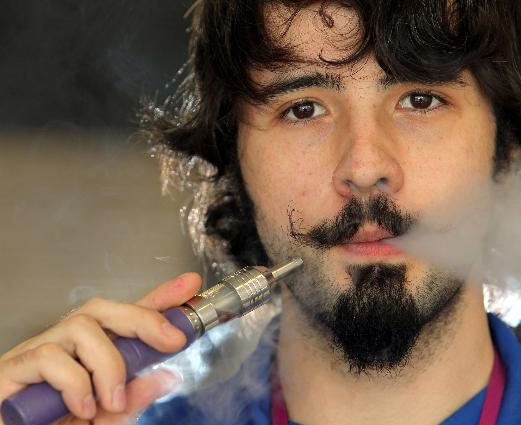E-Cigarette Makers Give Public the Finger
Rob Waters, Contributor, Forbes
With Sarah Mittermaier and Lily Swartz
In 1964, smoking was everywhere: on television, on airplanes, in workplaces and movie theatres, college campuses, doctors’ offices, restaurants and bars. In the 50 years since the first Surgeon General’s report on smoking and health was released, smoking has gradually faded to the margins of public life. TheMarlboro man was bounced from the airwaves, comprehensive smoking bans were passed in hundreds of cities and 28 states, and smoking rates were cut almost in half. The struggle to protect the public’s health is far from over—and shocking disparities in tobacco use and exposure to tobacco marketing remain—but we’re now reaping some rewards, with eight million lives saved over the past half-century.
But now a new threat is emerging. The use of e-cigarettes is rising rapidly, with teenagers a key target of marketing efforts. “Vaping” is making smoking acceptable—even cool—once again as the tobacco industry returns to its old ways, putting e-cigarette commercials back on the airwaves for the first time since the 1970s.

Right now, e-cigarettes exist in what tobacco control researcher Stanton Glanz calls a regulatory “Wild West,” with no federal regulation of the manufacturing, marketing and sales of these products. This regulatory vacuum threatens to undo the hard-won victories of the past 50 years in tobacco control.
E-cigarette companies are taking a page right out of Big Tobacco’s old-school playbook: marketing their products with sex appeal, celebrity endorsements, even cartoons. The companies argue that “vaping” is safer than traditional smoking and that may or may not be true—there are far too few studies to back up that claim or refute it. But it’s also a smokescreen.
The tobacco industry is out to hook kids, and it’s working. E-cigarettes come in an array of kid-friendly flavors, from“Cherry Crush” to “Coca Cola.” And unlike conventional cigarettes, e-cigarettes can legally be sold to kids in most US states. Data released last year by the Centers for Disease Control and Prevention showed that e-cigarette use more than doubled among middle and high school students in the previous year. For 20 percent of the middle schoolers, e-cigarettes were their first experience with smoking, raising concerns that e-cigarettes may act as a gateway to the use of other tobacco products.
E-cigarettes also threaten to reintroduce smoking to workplaces, restaurants, bars and other public spaces where hard-fought public health campaigns have succeeded in banning cigarettes. These policies have changed our communities from the ground up, creating new expectations and norms around smoking. The science is still out on whether e-cigarettes threaten non-smokers with toxic exposure, but their use in public legitimizes their use, making them seem acceptable, even Golden Globes-glamorous. We can’t let e-cigarettes undo the hard work tobacco control advocates have achieved over the past 50 years.
Some cities and states are pushing back against e-cigarettes, taking steps to regulate the sale and public use of e-cigarettes. Over the past few months, New York and Chicago city councils voted to regulate e-cigarettes as tobacco products, extending existing smoking bans to cover vaping. The Los Angeles City Council voted unanimously to regulate the sales of e-cigarettes. Boston has banned e-cigarette smoking in workplaces. States such as Utah, New Jersey, and North Dakota ban the use of e-cigarettes in indoor public spaces.
These local and state efforts should be followed—and strengthened—by federal action. Attorneys general from 40 states have called on the Food and Drug Administration to regulate e-cigarettes as tobacco products, a move that would give the FDA the power to impose age restrictions and limit marketing of e-cigarettes. Proposed rules drafted by the agency have not yet been released publicly.
We can’t wait years for scientists to conduct new studies on the health risks of vaping before we take action. We know better than to trust the tobacco industry’s health claims about their products—or to trust the industry with our children’s future. The time for action is now. To paraphrase one anti-cigarette commercial in California: “Some people will say anything to sell (e-) cigarettes.”
http://www.forbes.com/sites/robwaters/2014/01/27/e-cigarette-makers-give-public-the-finger/



